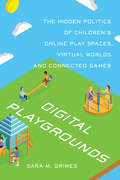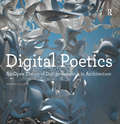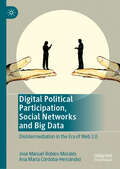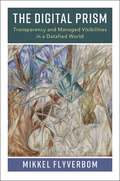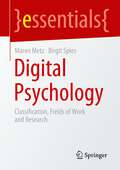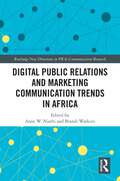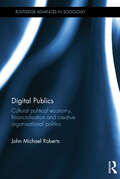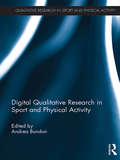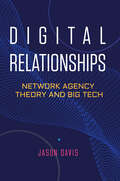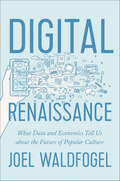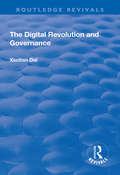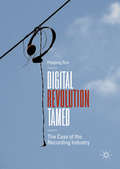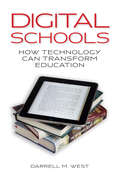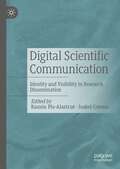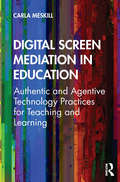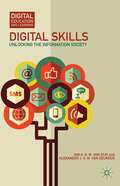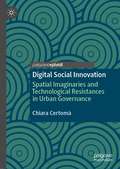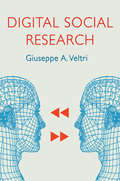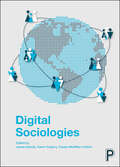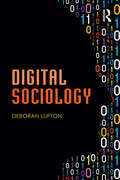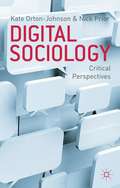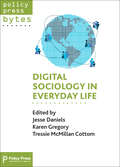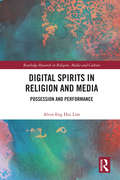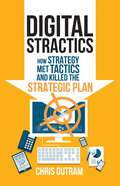- Table View
- List View
Digital Playgrounds: The Hidden Politics of Children’s Online Play Spaces, Virtual Worlds, and Connected Games
by Sara GrimesDigital Playgrounds explores the key developments, trends, debates, and controversies that have shaped children’s commercial digital play spaces over the past two decades. It argues that children’s online playgrounds, virtual worlds, and connected games are much more than mere sources of fun and diversion – they serve as the sites of complex negotiations of power between children, parents, developers, politicians, and other actors with a stake in determining what, how, and where children’s play unfolds. Through an innovative, transdisciplinary framework combining science and technology studies, critical communication studies, and children’s cultural studies, Digital Playgrounds focuses on the contents and contexts of actual technological artefacts as a necessary entry point for understanding the meanings and politics of children’s digital play. The discussion draws on several research studies on a wide range of digital playgrounds designed and marketed to children aged six to twelve years, revealing how various problematic tendencies prevent most digital play spaces from effectively supporting children’s culture, rights, and – ironically – play. Digital Playgrounds lays the groundwork for a critical reconsideration of how existing approaches might be used in the development of new regulation, as well as best practices for the industries involved in making children’s digital play spaces. In so doing, it argues that children’s online play spaces be reimagined as a crucial new form of public sphere in which children’s rights and digital citizenship must be prioritized.
Digital Poetics: An Open Theory of Design-Research in Architecture (Design Research in Architecture)
by Marjan CollettiDigital Poetics celebrates the architectural design exuberance made possible by new digital modelling techniques and fabrication technologies. By presenting an unconventional and original ’humanistic’ theory of CAD (computer-aided design), the author suggests that beyond the generation of innovative engineering forms, digital design has the potential to affect the wider complex cultural landscape of today in profound ways. The book is organised around a synthetic and hybrid research methodology: a contemporary, propositional and theoretical discursive investigation and a design-led empirical research. Both methods inform a critical construct that deals with the nature, forms, and laws of digitality within a contemporary architectural discourse that affects practice and academia. The chapters spiral at, from, towards, around, outside-inwards and back inside-out digitality, its cognitive phenomena, spatial properties and intrinsic capabilities to achieve, or at least, approach Digital Poetics. The book presents speculative and small-scale constructed projects that pioneer techniques and experiments with common 3D and 4D software packages, whereby the focus lies not on the drawing processes and mechanics, but on the agency and impact the image (its reading, experience, interpretation) achieves on the reader and observer. The book also features a preface by Frédéric Migayrou, a philosopher and curator, and one of the most influential cultural engineers of the contemporary international architectural scene. The book is linked to a website, which contains a larger selection of images of some featured projects.
Digital Political Participation, Social Networks and Big Data: Disintermediation in the Era of Web 2.0
by José Manuel Robles-Morales Ana María Córdoba-HernándezThis book explores the changes in political communication in light of the development of a public opinion mediated by web 2.0 technologies. One of the most important changes in political communication is related to the process of disintermediation, i.e. the process by which digital technologies allow citizens to compete in the public space with those agents who, traditionally, co-opted public opinion. However, while disintermediation has undeniably generated a number of advances, having linked citizens to the public debate, the authors highlight some aspects where disintermediation is moving away from a rational and inclusive public space. They argue that these aspects, related to the immediacy, polarization and incivility of the communication, obscure the possibilities for democratization of digital political communication.
The Digital Prism: Transparency and Managed Visibilities in a Datafied World
by Mikkel FlyverbomMany people are concerned about the unchecked powers of tech giants and the hidden operations of big data and algorithms. Yet we do not have the vocabularies to properly articulate how these digital transformations shape our lives. This book shows how the management of visibilities - our digital footprints - is a central force in the digital transformation of societies and politics. Seen through the prism of digital technologies and data, the lives of people and structuring of organizations take new shapes in our understanding. Making sense of these requires that we push beyond common ways of thinking about transparency and surveillance, and look at how managing visibilities is a central but overlooked force that influences how people live, how organizations work and how societies and politics operate.
Digital Psychology: Classification, Fields of Work and Research (essentials)
by Maren Metz Birgit SpiesThis Essential provides an initial overview of the intersections of digitalisation and psychology and outlines the developing field of digital psychology. It highlights current projects, formulates research questions and aims to stimulate discussion, action and further development.
Digital Public Relations and Marketing Communication Trends in Africa (Routledge New Directions in PR & Communication Research)
by Brandi Watkins Anne W. NjathiThe uptake of digital media platforms necessitates the need to understand how digital cultures of consumers and brands are unfolding. Despite the increase in usage and adoption of the internet in Africa, there is limited information about digital marketing trends on the continent. This book is among the first to present an edited collection of chapters on digital and influencer marketing authored by many who are either from or have close ties to Africa.This book showcases digital marketing trends in Africa that are burgeoning at the same speed as the uptake of technology in the continent. With this in mind, the contributors seek to interrogate digital marketing trends in two stages: the status of digital marketing on the African continent, including cases from Nigeria, Egypt, Uganda and Kenya, and an analysis of the rise of influencer marketing, including cases from Nigeria and Uganda. This book will explore factors driving the increase in digital media platforms in Africa as well as an analysis of the implications of the growth in digital marketing, using various theoretical and methodological underpinnings to probe trends.Digital Public Relations and Marketing Communication Trends in Africa provides significant implications for marketing scholars and researchers and will be relevant to those looking to understand the opportunities and challenges ahead.
Digital Publics: Cultural Political Economy, Financialisation and Creative Organisational Politics (Routledge Advances in Sociology)
by John Michael RobertsToday we often hear academics, commentators, pundits, and politicians telling us that new media has transformed activism, providing an array of networks for ordinary people to become creatively involved in a multitude of social and political practices. But what exactly is the ideology lurking behind these positive claims made about digital publics? By recourse to various critical thinkers, including Marx, Bakhtin, Deleuze and Guattari, and Gramsci, Digital Publics systematically unpacks this ideology. It explains how a number of influential social theorists and management gurus have consistently argued that we now live in new informational times based in global digital systems and new financial networks, which create new sbjectivities and power relations in societies. Digital Publics traces the historical roots of this thinking, demonstrates its flaws and offers up an alternative Marxist-inspired theory of the public sphere, cultural political economy and financialisation. The book will appeal to scholars and students of cultural studies, critical management studies, political science and sociology.
Digital Qualitative Research in Sport and Physical Activity (Qualitative Research in Sport and Physical Activity)
by Andrea BundonTwitter, Facebook, online forums, blogs and websites – scholars are increasingly turning to digital sources to study sport and physical activity. These platforms have generated new digital content ripe for analysis and are making it possible to investigate communities that were previously inaccessible. However, they have also created theoretical, methodological, practical and ethical challenges. This book critically examines the opportunities open to qualitative researchers working in digital spaces and offers novel insights into how the rise of new technology is helping to shape sport studies. Showcasing original research on emerging themes, trends and issues such as digital sociology, media citizenship, online gaming, Big Data, fitness apps and online fan cultures, this collection leads the way in this fast-developing field of study. It not only considers the possibilities and limitations of using digital tools to conduct qualitative research into sport, but also provides innovative examples of how researchers can adapt successfully to ever-evolving technologies. Digital Qualitative Research in Sport and Physical Activity is essential reading for all students and scholars interested in the latest digital developments in sport studies and research methods.
Digital Relationships: Network Agency Theory and Big Tech
by Jason DavisWhy do so many organizations fail to mobilize the social networks of employees to respond to disruptions, innovate, and change? In Digital Relationships, Jason Davis argues that individual and organizational interests about networking can come out of alignment such that the network ties that individuals form are organizationally sub-optimal for achieving their most ambitious goals. Developing a new perspective about networks and organizations, he explains through network agency theory how network problems emerge, the role of digital technology adoption by organizations in amplifying misalignment, and the capacity of managers and function of the executive to resolve agency problems and mitigate their impact. Drawing on over a decade of qualitative research in US, Asian, and European "big tech" companies and new analytical and computational modeling, this book offers new interpretations and solutions to the pathologies that emerge from organizationally detrimental networking behaviors and in the face of managerial interventions.
Digital Renaissance: What Data and Economics Tell Us about the Future of Popular Culture
by Joel WaldfogelHow digital technology is upending the traditional creative industries—and why that might be a good thingThe digital revolution poses a mortal threat to the major creative industries—music, publishing, television, and the movies. The ease with which digital files can be copied and distributed has unleashed a wave of piracy with disastrous effects on revenue. Cheap, easy self-publishing is eroding the position of these gatekeepers and guardians of culture. Does this revolution herald the collapse of culture, as some commentators claim? Far from it. In Digital Renaissance, Joel Waldfogel argues that digital technology is enabling a new golden age of popular culture, a veritable digital renaissance.By reducing the costs of production, distribution, and promotion, digital technology is democratizing access to the cultural marketplace. More books, songs, television shows, and movies are being produced than ever before. Nor does this mean a tidal wave of derivative, poorly produced kitsch; analyzing decades of production and sales data, as well as bestseller and best-of lists, Waldfogel finds that the new digital model is just as successful at producing high-quality, successful work as the old industry model, and in many cases more so. The vaunted gatekeeper role of the creative industries proves to have been largely mythical. The high costs of production have stifled creativity in industries that require ever-bigger blockbusters to cover the losses on ever-more-expensive failures.Are we drowning in a tide of cultural silt, or living in a golden age for culture? The answers in Digital Renaissance may surprise you.
The Digital Revolution and Governance (Routledge Revivals)
by Xiudian DaiThis title was first published in 2000. This text examines the politics of the digital age, looking at topics including new industrial policies, the implications of the Internet and global governance of innovation.
Digital Revolution Tamed: The Case of the Recording Industry
by Hyojung SunThis book explores why widespread predictions of the radical transformation in the recording industry did not materialise. Although the growing revenue generated from streaming signals the recovery of the digital music business, it is important to ask to what extent is the current development a response to digital innovation. Hyojung Sun finds the answer in the detailed innovation process that has taken place since Napster. She reassesses the way digital music technologies were encultured in complex music valorisation processes and demonstrates how the industry has become reintermediated rather than disintermediated. This book offers a new understanding of digital disruption in the recording industry. It captures the complexity of the innovation processes that brought about technological development, which arose as a result of interaction across the circuit of the recording business – production, distribution, valorisation, and consumption. By offering a more sophisticated account than the prevailing dichotomy, the book exposes deterministic myths surrounding the radical transformation of the industry.
Digital Schools
by Darrell M. WestNearly a century ago, famed educator John Dewey said that "if we teach today's students as we taught yesterday's, we rob them of tomorrow." That wisdom resonates more strongly than ever today, and that maxim underlies this insightful look at the present and future of education in the digital age.As Darrell West makes clear, today's educational institutions must reinvent themselves to engage students successfully and provide them with the skills needed to compete in an increasingly global, technological, and online world. Otherwise the American education system will continue to fall woefully short in its mission to prepare the population to survive and thrive in a rapidly changing world.West examines new models of education made possible by enhanced information technology, new approaches that will make public education in the post-industrial age more relevant, efficient, and ultimately more productive. Innovative pilot programs are popping up all over the nation, experimenting with different forms of organization and delivery systems. Digital Schools surveys this promising new landscape, examining in particular personalized learning; realtime student assessment; ways to enhance teacher evaluation; the untapped potential of distance learning; and the ways in which technology can improve the effectiveness of special education and foreign language instruction. West illustrates the potential contributions of blogs, wikis, social media, and video games and augmented reality in K-12 and higher education.Technology by itself will not remake education. But if today's schools combine increased digitization with needed improvements in organization, operations, and culture, we can overcome current barriers, produce better results, and improve the manner in which schools function. And we can get back to teaching for tomorrow, rather than for yesterday.
Digital Schools
by Darrell M. WestNearly a century ago, famed educator John Dewey said that "if we teach today's students as we taught yesterday's, we rob them of tomorrow." That wisdom resonates more strongly than ever today, and that maxim underlies this insightful look at the present and future of education in the digital age.As Darrell West makes clear, today's educational institutions must reinvent themselves to engage students successfully and provide them with the skills needed to compete in an increasingly global, technological, and online world. Otherwise the American education system will continue to fall woefully short in its mission to prepare the population to survive and thrive in a rapidly changing world.West examines new models of education made possible by enhanced information technology, new approaches that will make public education in the post-industrial age more relevant, efficient, and ultimately more productive. Innovative pilot programs are popping up all over the nation, experimenting with different forms of organization and delivery systems. Digital Schools surveys this promising new landscape, examining in particular personalized learning; realtime student assessment; ways to enhance teacher evaluation; the untapped potential of distance learning; and the ways in which technology can improve the effectiveness of special education and foreign language instruction. West illustrates the potential contributions of blogs, wikis, social media, and video games and augmented reality in K-12 and higher education.Technology by itself will not remake education. But if today's schools combine increased digitization with needed improvements in organization, operations, and culture, we can overcome current barriers, produce better results, and improve the manner in which schools function. And we can get back to teaching for tomorrow, rather than for yesterday.
Digital Scientific Communication: Identity and Visibility in Research Dissemination
by Ramón Plo-Alastrué Isabel CoronaThis edited book analyses current trends in science communication and gathers research on practices related to the construction of digital identity and visibility, emerging conflicts related to the public availability and appropriation of scientific culture, and ways of validating and disseminating scientific knowledge in new digital contexts. Drawing on a selection of papers presented in the InterGedi Conference (Zaragoza, December 2021), the main goal of the volume is to identify and explore emerging professional practices and challenges in the digital communication of science through innovative multimodal genres. This book will be of interest to postgraduates, doctoral students, practitioners and researchers in the fields of discourse analysis, sociolinguistics, digital media, multimodality and communication studies.
Digital Screen Mediation in Education: Authentic and Agentive Technology Practices for Teaching and Learning
by Carla MeskillDigital Screen Mediation in Education explores the complex role of visual mediation in today’s digitally enhanced classrooms. While the notion that technology tools have agency—that they act to induce learning—pervades contemporary conversations about pedagogy, this unique volume reframes instructional agency around teachers. The book’s theoretically reinforced and multidisciplinary approach to enhancing effective instruction with screen-based technologies spans aesthetics, technical knowledge, teacher empowerment, social media, and beyond. Researchers in educational technology, instructional design, online learning, and digital pedagogies as well as prospective and practicing educators will find a rigorous treatment of how skilled, thoughtful teaching with, through, and around digital screens can bring about successful learning outcomes.
Digital Skills
by Jan A. G. M. van Dijk Alexander J. A. M. van DeursenThe first book to systematically discuss the skills and literacies needed to use digital media, particularly the Internet, van Dijk and van Deursen's clear and accessible work distinguishes digital skills, analyzes their roles and prevalence, and offers solutions from individual, educational, sociological, and policy perspectives.
Digital Social Innovation: Spatial Imaginaries and Technological Resistances in Urban Governance
by Chiara CertomàThis book engages the reader in exploring the relationships between digital social innovation initiatives and the city. It delivers a fresh, accessible and case-based discussion on the emergence of digitally-enabled social innovation practices in Europe that are redesigning the urban space and challenging the consolidated urban governance processes. By adopting a critical geography perspective, this ground-breaking analysis of digital social innovation provides the reader with an accessible overview of the way in which urban reproductive processes mobilise the physical and the virtual dimensions of the city and generate distinctive spatial configurations. Together with novel urban narratives and socio-technical imaginaries, these support the existing geometries of power or construct new ones. The author clearly describes contemporary cities as the new battlegrounds for controlling the digital sphere, shaped by the interplay between digital capitalism and resistance movements. In light of grassroots initiatives advanced by cyber-activists, e-makers and hackers, the book unveils the socio-political and cultural underpinnings of the revolution produced by the digital social innovations in the city and the socio-technological regimes supporting them. This author successfully sheds new critical light on traditional innovation studies exploring the debate on digital innovation through the lens of social and cultural geography providing an invaluable reference for those working in this field.
Digital Social Research
by Giuseppe A. VeltriTo analyse social and behavioral phenomena in our digitalized world, it’s necessary to understand the main research opportunities and challenges specific to online and digital social research. This book presents an overview of the many techniques that are part of the fundamental toolbox of the digital social scientist. Placing online methods within the wider tradition of social research methods, Giuseppe Veltri discusses the methodological principles and related frameworks that underlie each technique of digital research. This useful guide covers methodological issues such as different digital data types, sampling for big data, construct validity, and representativeness. It looks at different forms of unobtrusive data collection methods (web scraping, social media mining) as well as obtrusive methods (qualitative methods, web surveys, and experiments). Special attention is given to three key analytical approaches, explored in more detail: computational approaches to statistical analysis, text mining, and network analysis. Digital Social Research Methods will be a welcome and essential resource for students and researchers across the social sciences and humanities carrying out digital research or interested in the future of social research.
Digital Sociologies
by Jessie Daniels, Karen Gregory & Tressie McMillan CottomProviding a much needed overview of the growing field of digital sociology, this handbook connects digital media technologies to the traditional sociological areas of study, like labour, culture, education, race, class and gender. Rooted in a critical understanding of inequality as foundational to digital sociology and is edited by leaders in the field. It includes topics ranging from web analytics, wearable technologies, social media analysis and digital labour. This rigorous, accessible text explores contemporary dilemmas and problems of the digital age in relation to inequality, institutions and social identity, making it suitable for use for a global audience on a variety of social science courses and beyond. Offering an important step forward for the discipline of sociology Digital sociologies is an important intellectual benchmark in placing digital at the forefront of investigating the social.
Digital Sociology
by Deborah LuptonWe now live in a digital society. New digital technologies have had a profound influence on everyday life, social relations, government, commerce, the economy and the production and dissemination of knowledge. People’s movements in space, their purchasing habits and their online communication with others are now monitored in detail by digital technologies. We are increasingly becoming digital data subjects, whether we like it or not, and whether we choose this or not. The sub-discipline of digital sociology provides a means by which the impact, development and use of these technologies and their incorporation into social worlds, social institutions and concepts of selfhood and embodiment may be investigated, analysed and understood. This book introduces a range of interesting social, cultural and political dimensions of digital society and discusses some of the important debates occurring in research and scholarship on these aspects. It covers the new knowledge economy and big data, reconceptualising research in the digital era, the digitisation of higher education, the diversity of digital use, digital politics and citizen digital engagement, the politics of surveillance, privacy issues, the contribution of digital devices to embodiment and concepts of selfhood and many other topics. Digital Sociology is essential reading not only for students and academics in sociology, anthropology, media and communication, digital cultures, digital humanities, internet studies, science and technology studies, cultural geography and social computing, but for other readers interested in the social impact of digital technologies.
Digital Sociology
by Kate Orton-Johnson Nick PriorSociology and our sociological imaginations are having to confront new digital landscapes spanning mediated social relationships, practices and social structures. This volume assesses the substantive challenges faced by the discipline as it critically reassesses its position in the digital age.
Digital sociology in everyday life
by Jessie Daniels, Karen Gregory & Tressie McMillan CottomDigital technologies, digital media, and mobile technologies now shape the experience of everyday life in the Western world, yet the way our quotidian lives are enmeshed with these technologies is far from clearly understood. Through studies of the digital everyday, sociologists are beginning to reinvigorate the sociological imagination in light of digitization. Chapters in this Byte cover topics such as designing a research framework and how to work ethically as a digital researcher, continually interrogating one’s position as a researcher and reflecting on the process of knowledge creation. Cumulatively, they highlight the value of sociological theory for understanding our digital world.
Digital Spirits in Religion and Media: Possession and Performance (Routledge Research in Religion, Media and Culture)
by Alvin Eng LimIn many contemporary and popular forms of religious practice, digital technology and the spiritual are inseparable. Ranging from streaming broadcasts of spiritual possessions to screenings of mass prayer conferences in stadiums, spirits and divinities now have new forms in which they can materialise. By offering the notion of ‘digital spirits’, this book critically attends to the intersections of digital media and spiritual beings. It also puts forward a new performative perspective on how they interact. Taking cues from the work of Stewart Hoover and Heidi Campbell, among others, the book begins with an outline of the current debates around religion, performance and digital media. It then moves on to examine how mediality and religion, where embodied practices are carried out alongside virtual practices, work together in contemporary Asia. These case studies focus on lived religious practices in combination with various forms of media, and so help demonstrate that digital technology in particular reveals the layered processes of spirituality in practice. Gods and divinities have always relied on media to manifest, and this book is a fascinating exploration of how digital media has continued that tradition and taken it in new directions. As such, it will be of great interest to scholars of religious studies, digital media and performance studies.
Digital Stractics: How Strategy Met Tactics And Killed The Strategic Plan
by Chris OutramIn the world of digital business, the line between strategy and tactics is blurring. Traditionally large companies would adopt strategic frameworks which planned over three- to five-year timescales, while most digital start-ups had little interest in comprehensive and rigorous strategic processes and simply set themselves vision and worked out how to get there along the way. In today's digital economy even large companies are finding that their planning horizons are being measured in months rather than years or quarters (if not yet in the weeks or even days of startups). On the other hand, investors are less swayed by the excitement of 'digital' and expect harder and more rigorous medium term planning from start-ups. As a result, while the empirical process of learning by doing is becoming part of traditional companies' strategy processes, digital pure plays are no longer just making it up as they go along, but actively learning and changing as they go along. In short: on the battlefield of online commerce, strategy blends with tactics. Indeed, the distinction between pure play and hybrid is increasingly redundant as more holistic business models begin to emerge. Digital Stractics captures the experience and insights of some 60 entrepreneurs, CEOs and chairmen of both pure plays and hybrids to formulate frameworks within which both pure plays and hybrids can shape their strategy and business models. As timescales between 'plan' and 'do' collapse strategy and tactics have to blend. The world of STRACTICS is upon us.
